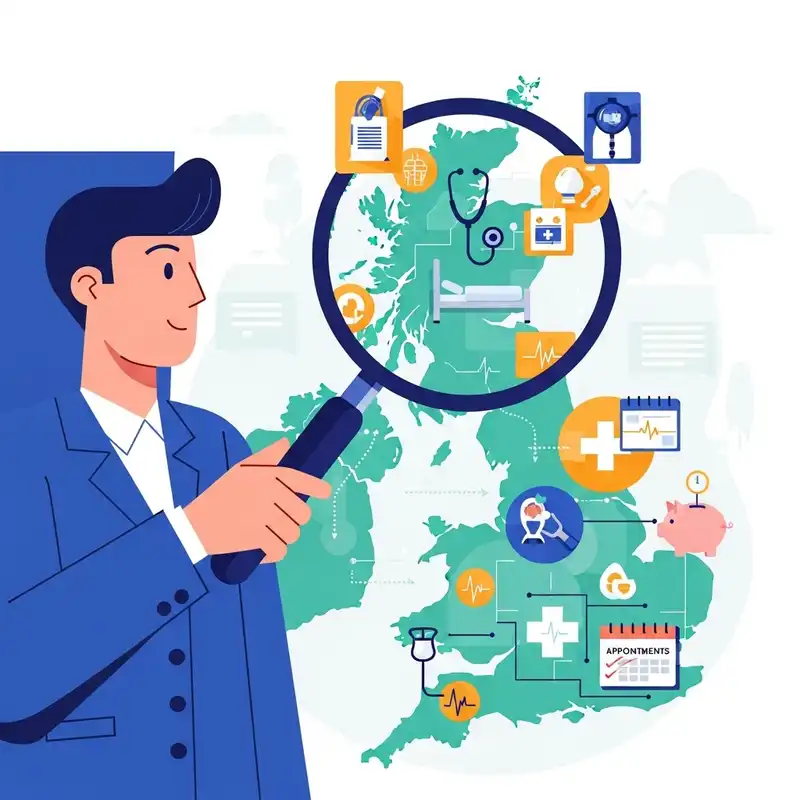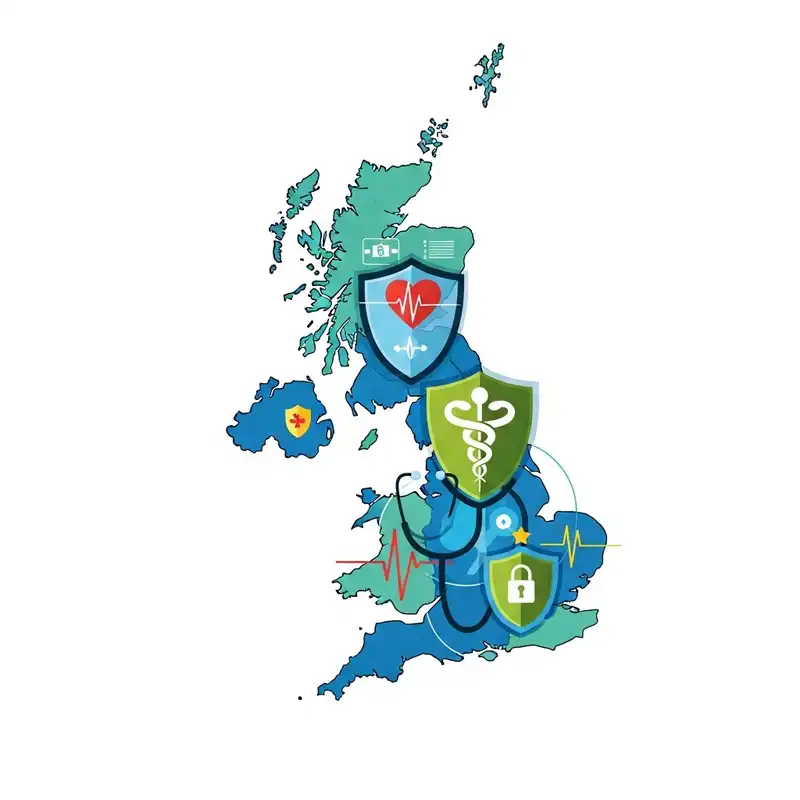Colonoscopy What to Expect

WeCovr explains colonoscopies, preparation, and PMI coverage
As an FCA-authorised expert that has helped arrange over 900,000 policies, WeCovr understands that medical procedures can be daunting. This guide demystifies the colonoscopy process, explaining what it is, how to prepare, and how private medical insurance in the UK can provide fast access to this vital diagnostic test.
What is a Colonoscopy and Why is it so Important?
A colonoscopy is a medical procedure used to examine the inside of your large bowel (your colon and rectum). It's considered the 'gold standard' for detecting abnormalities because it allows a doctor to see the entire length of the colon in high-definition detail.
During the procedure, a specialist called a gastroenterologist or a colorectal surgeon uses a thin, flexible tube called a colonoscope. This tube is about the thickness of a finger and has a tiny camera and light on its tip. It is carefully passed into your back passage (anus) and guided through your colon. The live video feed is displayed on a screen, giving the doctor a clear view of your bowel lining.
A colonoscopy is crucial for several reasons:
- Detecting Bowel Cancer Early: It can find bowel cancer at its earliest, most treatable stage, often before any symptoms appear.
- Finding and Removing Polyps: It can identify and remove small growths called polyps. While most polyps are harmless, some can develop into cancer over time. Removing them is one of the most effective ways to prevent bowel cancer.
- Investigating Symptoms: It helps doctors find the cause of unexplained symptoms like bleeding from your back passage, persistent changes in your bowel habits, abdominal pain, or unexplained weight loss.
- Diagnosing Conditions: It can diagnose other bowel conditions, such as Crohn's disease, ulcerative colitis, and diverticular disease.
Think of it as a comprehensive internal health check for your bowel, providing peace of mind or an early diagnosis that could save your life.
The UK Picture: Bowel Cancer and Colonoscopy Statistics
Understanding the landscape in the UK highlights why timely access to colonoscopies is so vital.
According to Cancer Research UK, bowel cancer is the fourth most common cancer in the UK. Tragically, it's the second biggest cancer killer. However, the good news is that when it's caught early, it's highly treatable. Over 90% of people diagnosed at the earliest stage (Stage 1) survive for five years or more.
The NHS has a bowel cancer screening programme in England, Scotland, and Wales for people over a certain age. This usually involves an at-home kit (the Faecal Immunochemical Test or FIT) that looks for hidden blood in your poo. If the test shows anything unusual, you'll be invited for a colonoscopy.
However, NHS waiting lists for diagnostic tests can be long. The latest NHS England data often shows that hundreds of thousands of people are waiting for key diagnostic tests, including colonoscopies. These waits can be a source of significant anxiety and can delay diagnosis and treatment. This is one of the primary reasons many people consider private medical insurance.
| Feature | NHS Pathway | Private Pathway (with PMI) |
|---|---|---|
| Referral | GP refers you to a specialist. | GP refers you to a specialist. |
| Waiting Time | Can be several weeks or months, depending on location and urgency. | Typically days or a couple of weeks. |
| Choice of Hospital | Limited to local NHS hospitals. | Wide choice from a pre-approved hospital list. |
| Choice of Consultant | Usually assigned a consultant. | You can often choose your specialist. |
| Facilities | Ward-based recovery. | Private, en-suite room for preparation and recovery. |
Who Needs a Colonoscopy? Common Symptoms and Risk Factors
A colonoscopy might be recommended by your GP or a specialist if you have certain symptoms or risk factors.
Common Symptoms That May Require a Colonoscopy:
- Blood in your poo (stools): This can be bright red, dark red, or black.
- Bleeding from your back passage: Seeing blood on the toilet paper or in the toilet bowl.
- A persistent change in bowel habits: This includes pooing more often, with looser, runnier stools, or constipation that isn't normal for you.
- Unexplained abdominal pain: A lump or persistent pain in your tummy area.
- Unexplained weight loss: Losing weight without dieting or trying to.
- Persistent fatigue or tiredness: Sometimes caused by anaemia (a lack of iron) due to slow, undetected bleeding in the bowel.
Key Risk Factors for Bowel Cancer:
- Age: Over 90% of cases occur in people aged 50 or over.
- Family History: Having a close relative (parent, sibling, child) diagnosed with bowel cancer, especially under the age of 50.
- Personal History: A history of non-cancerous polyps in your bowel.
- Inflammatory Bowel Disease: A history of long-term Crohn's disease or ulcerative colitis.
- Lifestyle: A diet high in red and processed meats, being overweight or obese, smoking, and drinking too much alcohol can increase your risk.
If any of these symptoms or risk factors apply to you, it's essential to speak to your GP without delay.
The Colonoscopy Journey: A Step-by-Step Guide
The process from your first symptom to getting your results can be broken down into clear stages.
- The GP Visit: Your journey starts with a visit to your GP. You'll discuss your symptoms and medical history. Your GP may perform a physical examination and may request a blood test or a stool sample (like the FIT kit).
- The Referral: If your GP thinks a colonoscopy is needed, they will refer you to a specialist consultant (a gastroenterologist). If you have private medical insurance, you'll ask for a private referral. You then contact your PMI provider to get the consultation and subsequent tests authorised.
- The Consultation: You'll meet the consultant to discuss the procedure in detail. They'll explain the benefits, risks, and what you need to do to prepare. This is your chance to ask any questions you have.
- The Preparation ('Bowel Prep'): This is a critical stage that starts a few days before your appointment. You'll need to follow a special diet and take strong laxatives to completely empty your colon.
- The Procedure: On the day, you'll go to the hospital or clinic. The colonoscopy itself usually takes 30 to 60 minutes.
- Recovery: You'll rest in a recovery area for a couple of hours until the effects of the sedation wear off.
- The Results: The consultant can often give you preliminary findings straight after the procedure. If biopsies were taken, the full results will be available in a week or two.
Preparing for Your Colonoscopy: The 'Bowel Prep'
This is often the part people worry about most, but getting it right is essential for a successful colonoscopy. If the bowel isn't completely clean, the consultant's view will be poor, and polyps or other important findings could be missed. The procedure might even have to be stopped and rescheduled.
Your hospital will give you specific instructions and a powerful laxative solution to drink.
Typical Bowel Prep Timeline:
- 2-3 Days Before: You'll start a 'low-residue' diet. This means avoiding high-fibre foods.
- The Day Before: You'll switch to a clear-fluid-only diet. You will also start drinking the laxative solution, usually in two separate doses.
- The Day Of: You'll continue with clear fluids until a few hours before your appointment, then stop all food and drink as instructed.
Low-Residue Diet: Foods to Eat and Avoid
| Eat These (Low-Fibre) | Avoid These (High-Fibre) |
|---|---|
| White bread, white pasta, white rice | Wholegrain bread, brown rice, wholewheat pasta |
| Plain chicken, turkey, or fish (no skin) | Red meat, processed meats (sausages, burgers) |
| Boiled or poached eggs | Nuts, seeds, and anything containing them |
| Clear soups (broth) | Vegetables, especially with skins (potatoes, corn) |
| White chocolate, boiled sweets, jelly | Fruit, especially with skins or pips (berries, oranges) |
| Yoghurt (plain, no fruit bits) | Lentils, beans, and pulses |
| Skimmed milk | Popcorn, cakes with fruit/nuts |
Clear Fluids You Can Have:
- Water
- Clear, light-coloured sports drinks
- Clear broth (no solid bits)
- Black tea or coffee (no milk)
- Diluted fruit squash (not red, purple, or black)
- Jelly (not red, purple, or black)
Tips for Making Bowel Prep More Tolerable:
- Chill the Laxative: The solution often tastes better when it's very cold. Keep it in the fridge.
- Use a Straw: Position the straw at the back of your tongue to bypass some of your taste buds.
- Stay Near the Loo: Once the laxative starts working, you'll need the toilet urgently and frequently. Don't plan any trips out!
- Protect Your Skin: Use moist toilet wipes instead of dry paper and apply a barrier cream (like Sudocrem or Vaseline) to prevent soreness.
- Distract Yourself: Line up a good book, a TV series, or a podcast to help pass the time.
The Day of the Procedure: What to Expect
When you arrive at the hospital or clinic, you'll be checked in by a nurse who will go over your medical history and ask you to sign a consent form.
Sedation Options
You will be offered a choice to make you more comfortable:
- Conscious Sedation: This is the most common option. You'll be given a sedative and a painkiller through a small plastic tube (a cannula) in your arm or hand. It will make you feel sleepy and relaxed, but you'll still be awake enough to follow simple instructions. Most people remember very little about the procedure afterwards.
- Gas and Air (Entonox): Similar to what's used in childbirth, this is a fast-acting painkiller you breathe in through a mouthpiece. You control how much you use.
- No Sedation: Some people choose to have the procedure with no sedation at all. This is perfectly possible, but you may feel more discomfort from cramping or wind. The benefit is that you can leave and get back to normal activities much sooner.
You'll change into a hospital gown. During the procedure, you'll lie on your side on a trolley, with your knees brought up towards your chest. The consultant will gently insert the colonoscope and slowly advance it through your colon, pumping a small amount of carbon dioxide gas inside to inflate the bowel for a better view.
If they see any polyps, they can usually remove them there and then using a tiny wire loop passed through the colonoscope. This is painless. They may also take small tissue samples (biopsies) for analysis in a lab.
After the Colonoscopy: Recovery and Results
The procedure itself is quite quick. Afterwards, you'll be moved to a recovery room.
- Immediate Recovery: Nurses will monitor your blood pressure and heart rate. You might feel a bit bloated or have some mild cramping as the gas escapes. Passing wind is a good sign! You'll be offered a drink and a light snack.
- Going Home: If you had sedation, you must have a responsible adult to take you home and stay with you for 24 hours. You cannot drive, operate machinery, drink alcohol, or sign legal documents for 24 hours after sedation.
- Getting Your Results: The consultant will usually speak to you before you leave to give you the initial findings. They will tell you if your colon looked healthy or if they found and removed any polyps. If biopsies were taken, they'll let you know when to expect the full laboratory results, which are typically sent to you and your GP within one to two weeks.
How Private Medical Insurance Covers Colonoscopies in the UK
Private medical insurance (PMI) is designed to cover the costs of diagnosis and treatment for acute conditions. An acute condition is a disease, illness, or injury that is likely to respond quickly to treatment and return you to your previous state of health.
A colonoscopy falls under the 'diagnostic tests' category of a PMI policy. Here's how it typically works:
- GP Referral: You visit your NHS GP who recommends a colonoscopy.
- Authorisation: You call your insurer with your referral. They will check your policy to ensure you are covered and will provide an authorisation number.
- Booking: You can then book your consultation and procedure with a specialist and hospital from your insurer's approved list. WeCovr can help you understand your hospital list and find the best consultant for your needs.
- Direct Payment: The insurer pays the hospital and consultant fees directly, minus any excess you have on your policy.
The Crucial Point: Pre-existing and Chronic Conditions
This is the most important rule of private medical insurance UK. Standard PMI policies do not cover pre-existing conditions. A pre-existing condition is any illness or symptom you had, sought advice for, or received treatment for before your policy started.
Furthermore, PMI does not cover the ongoing management of chronic conditions like Crohn's disease or ulcerative colitis. While PMI may cover the initial diagnostic colonoscopy that leads to a diagnosis of a chronic condition, the long-term management (medication, regular check-ups) would then revert to the NHS.
Example Scenario:
- Covered: You develop new symptoms (e.g., a change in bowel habits) six months after starting your PMI policy. Your GP refers you for a colonoscopy. Your PMI will cover the consultation, the procedure, and any initial treatment if something acute (like a cancerous polyp) is found.
- Not Covered: You were diagnosed with ulcerative colitis five years ago. You take out a new PMI policy today. A flare-up of your colitis next year, requiring a colonoscopy to monitor it, would not be covered as it's a pre-existing and chronic condition.
Understanding Your PMI Policy Details for Diagnostic Tests
When choosing a private health cover plan, you need to look at the details.
- Outpatient Limits: A colonoscopy is usually performed as a day-case or outpatient procedure. Some policies have a limit on how much they will pay for outpatient consultations and tests per year (e.g., £1,000). Other, more comprehensive policies, have full outpatient cover. Ensure your limit is high enough to cover the consultation and the procedure.
- Policy Excess: This is the amount you agree to pay towards a claim. For example, if your policy has a £250 excess and the colonoscopy costs £2,000, you pay the first £250 and your insurer pays the remaining £1,750. A higher excess usually means a lower monthly premium.
- Hospital List: Insurers have different tiers of hospitals. A standard list will include hundreds of high-quality private hospitals across the country, while a more expensive, extended list might include prime central London hospitals.
- Underwriting Type:
- Moratorium: You don't declare your medical history upfront. The insurer automatically excludes anything you've had symptoms of or treatment for in the last 5 years.
- Full Medical Underwriting (FMU): You complete a full health questionnaire. The insurer then tells you exactly what is and isn't covered from day one. This provides more certainty.
Navigating these options can be complex. An independent PMI broker like WeCovr can compare the market for you, explaining the pros and cons of each policy to find the best PMI provider for your budget and needs, at no extra cost to you.
Wellness & Lifestyle: Reducing Your Risk of Bowel Conditions
While screening is vital, a healthy lifestyle can significantly lower your risk of developing bowel cancer and other digestive issues.
- Diet: Aim for a diet rich in fibre from fruit, vegetables, and whole grains. Fibre helps keep your bowels regular and healthy. Try to limit your intake of red meat (beef, lamb, pork) and processed meats (bacon, sausages, ham).
- Exercise: Regular physical activity helps maintain a healthy weight and can reduce your risk. Aim for at least 150 minutes of moderate-intensity activity (like brisk walking) per week.
- Maintain a Healthy Weight: Being overweight or obese is a major risk factor for bowel cancer.
- Don't Smoke: Smoking increases the risk of developing polyps and bowel cancer.
- Limit Alcohol: Cutting down on alcohol can also lower your risk.
At WeCovr, we believe in proactive health management. That's why customers who purchase PMI or Life Insurance through us receive complimentary access to CalorieHero, our AI-powered calorie and nutrition tracking app, to help them build and maintain healthy habits. Furthermore, we offer discounts on other types of insurance, like income protection or critical illness cover, when you take out a health policy with us.
Frequently Asked Questions (FAQs)
Will private medical insurance cover a colonoscopy for screening purposes?
Is a colonoscopy painful?
What is the difference between a colonoscopy and a virtual colonoscopy (CT colonography)?
Can I get private health cover if I have a family history of bowel cancer?
Facing a potential health issue is stressful enough without worrying about waiting lists. Private medical insurance can offer the speed, choice, and comfort you need for peace of mind.
Ready to explore your options? Get a free, no-obligation quote from WeCovr today. Our expert advisors will help you compare leading UK insurers and find a policy that's right for you.
Related guides
Why private medical insurance and how does it work?
What is Private Medical Insurance?
Private medical insurance (PMI) is a type of health insurance that provides access to private healthcare services in the UK. It covers the cost of private medical treatment, allowing you to bypass NHS waiting lists and receive faster, more convenient care.How does it work?
Private medical insurance works by paying for your private healthcare costs. When you need treatment, you can choose to go private and your insurance will cover the costs, subject to your policy terms and conditions. This can include:• Private consultations with specialists
• Private hospital treatment and surgery
• Diagnostic tests and scans
• Physiotherapy and rehabilitation
• Mental health treatment
Your premium depends on factors like your age, health, occupation, and the level of cover you choose. Most policies offer different levels of cover, from basic to comprehensive, allowing you to tailor the policy to your needs and budget.
Questions to ask yourself regarding private medical insurance
Just ask yourself:👉 Are you concerned about NHS waiting times for treatment?
👉 Would you prefer to choose your own consultant and hospital?
👉 Do you want faster access to diagnostic tests and scans?
👉 Would you like private hospital accommodation and better food?
👉 Do you want to avoid the stress of NHS waiting lists?
Many people don't realise that private medical insurance is more affordable than they think, especially when you consider the value of faster treatment and better facilities. A great insurance policy can provide peace of mind and ensure you receive the care you need when you need it.
Benefits offered by private medical insurance
Private medical insurance provides numerous benefits that can significantly improve your healthcare experience and outcomes:Faster Access to Treatment
One of the biggest advantages is avoiding NHS waiting lists. While the NHS provides excellent care, waiting times can be lengthy. With private medical insurance, you can often receive treatment within days or weeks rather than months.
Choice of Consultant and Hospital
You can choose your preferred consultant and hospital, giving you more control over your healthcare journey. This is particularly important for complex treatments where you want a specific specialist.
Better Facilities and Accommodation
Private hospitals typically offer superior facilities, including private rooms, better food, and more comfortable surroundings. This can make your recovery more pleasant and potentially faster.
Advanced Treatments
Private medical insurance often covers treatments and medications not available on the NHS, giving you access to the latest medical advances and technologies.
Mental Health Support
Many policies include comprehensive mental health coverage, providing faster access to therapy and psychiatric care when needed.
Tax Benefits for Business Owners
If you're self-employed or a business owner, private medical insurance premiums can be tax-deductible, making it a cost-effective way to protect your health and your business.
Peace of Mind
Knowing you have access to private healthcare when you need it provides invaluable peace of mind, especially for those with ongoing health conditions or concerns about NHS capacity.
Private medical insurance is particularly valuable for those who want to take control of their healthcare journey and ensure they receive the best possible treatment when they need it most.
Important Fact!
We can look at a more suitable option mid-term!
Why is it important to get private medical insurance early?
👉 Many people are very thankful that they had their private medical insurance cover in place before running into some serious health issues. Private medical insurance is as important as life insurance for protecting your family's finances.👉 We insure our cars, houses, and even our phones! Yet our health is the most precious thing we have.
Easily one of the most important insurance purchases an individual or family can make in their lifetime, the decision to buy private medical insurance can be made much simpler with the help of FCA-authorised advisers. They are the specialists who do the searching and analysis helping people choose between various types of private medical insurance policies available in the market, including different levels of cover and policy types most suitable to the client's individual circumstances.
It certainly won't do any harm if you speak with one of our experienced insurance experts who are passionate about advising people on financial matters related to private medical insurance and are keen to provide you with a free consultation.
You can discuss with them in detail what affordable private medical insurance plan for the necessary peace of mind they would recommend! WeCovr works with some of the best advisers in the market.
By tapping the button below, you can book a free call with them in less than 30 seconds right now:
Our Group Is Proud To Have Issued 900,000+ Policies!
We've established collaboration agreements with leading insurance groups to create tailored coverage
























How It Works
1. Complete a brief form

2. Our experts analyse your information and find you best quotes

3. Enjoy your protection!

Any questions?
Learn more

Who Are WeCovr?
WeCovr is an insurance specialist for people valuing their peace of mind and a great service.👍 WeCovr will help you get your private medical insurance, life insurance, critical illness insurance and others in no time thanks to our wonderful super-friendly experts ready to assist you every step of the way.
Just a quick and simple form and an easy conversation with one of our experts and your valuable insurance policy is in place for that needed peace of mind!




